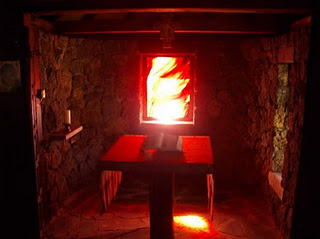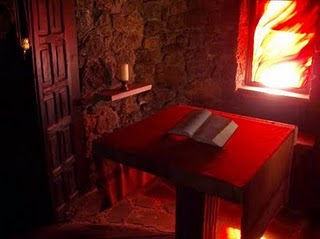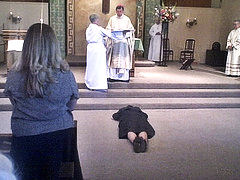Thanks for your questions. I must admit I am curious as to why you are asking them; what raised them for you? But in any case let me give them a shot. Labels like liberal and progressive are not always helpful I don't think. I don't know what they actually mean a lot of the time. I thought of myself as progressive or liberal when I was a student. Later though I came to see myself as essentially conservative --- conservative in a way I consider genuinely healthy.
What I mean by this is I hold onto the core truth, try to understand it more and more fully, and then try to apply it in ways which lead to new life, growth, maturity, etc. Since God is both "always the same" and the source of continuing newness and surprise I think this is the only way to go. Moreover, as a hermit, there is no doubt that I am part of a really ancient vocation whose roots are spiritually conservative but which is also incredibly prophetic and open to the newness which that leads to. When the roots are deep and lasting newness is not a problem. That said, I don't know whether most c 603 hermits are progressive, etc. Only occasionally do I hear of hermits whose conservatism veers from healthiness into a dystrophic traditionalism. On the other hand, those whose eremitism is not profoundly conservative in the sense I have described are unlikely to last as hermits unless and until they develop the roots healthy conservatism and the truly prophetic require.
 Before I answer your questions about eremitical life and Vatican II let me point you to a video of a hermit professed according to c 603 in the post-conciliar revised Code of Canon Law. Though a bit long it tells the story of the first contemporary solitary hermit in Ireland. Unfortunately Sister Irene Gibson rejects Vatican II and the post-conciliar Church utterly. Her conservatism has become a less healthy traditionalism. From what I can see from this video she and I disagree on almost everything theological except the fact that vocations are not a call issued and answered only once, but something we must respond to daily. Sister Irene believes this is because human beings are sinful and would fall away from their vocations otherwise. I accept that as a secondary reason but contend the primary reason is that God is a dynamic reality calling us at every moment and we are called to be responsive individuals whose "yes" is offered again and again.
Before I answer your questions about eremitical life and Vatican II let me point you to a video of a hermit professed according to c 603 in the post-conciliar revised Code of Canon Law. Though a bit long it tells the story of the first contemporary solitary hermit in Ireland. Unfortunately Sister Irene Gibson rejects Vatican II and the post-conciliar Church utterly. Her conservatism has become a less healthy traditionalism. From what I can see from this video she and I disagree on almost everything theological except the fact that vocations are not a call issued and answered only once, but something we must respond to daily. Sister Irene believes this is because human beings are sinful and would fall away from their vocations otherwise. I accept that as a secondary reason but contend the primary reason is that God is a dynamic reality calling us at every moment and we are called to be responsive individuals whose "yes" is offered again and again.I suspect Sister Irene's eremitical vows have since been dispensed because she really is entirely opposed to the contemporary Roman Catholic Church and exists in schism with it; she now lives with a Tridentine community of Sisters so far as I know, but nonetheless, I respect her and would say she was a true hermit with a true vocation to the silence of solitude. Whether she should ever have been professed as a canon 603 hermit is another question entirely. Her life says very clearly that God alone is sufficient and I admit I am quite impressed with her integrity and courage as someone living an intense solitude without even the support of her local (or national) Church for many years.
In the following video I think that despite the dislike with which she refers to the Roman Curia (" the bureaucrats in Rome"), her complete hatred for what Vatican II wrought, and a theology that, in my opinion, fails to do justice to either history or the God of Jesus Christ --- something that causes a distorted focus on sin rather than on the God of mercy --- there is a gentleness, a degree of humility, and real love for the people with whom Sister Irene interacts and for whom she prays. It is this capacity for humility, love, and compassion which grows in solitude along with a capacity for silent suffering that, I think, attests to the authenticity of Sister's eremitical vocation. The seriousness, reverence, and core of deep sadness and grief which informs a life which is truly loving only underscores this authenticity in my mind.
As for your questions regarding Vatican II and solitary eremitical life per se, I do not think it is possible to be a solitary hermit according to the Revised Code of Canon Law if one rejects Vatican II. First of all the very Code which allows for solitary hermits in universal law for the first time in the history of the Church is a result of Vatican II and the reforms achieved and envisioned there. It seems ironic in the extreme to me, not to mention inconsistent and more than a little self-serving and even potentially hypocritical to seek (or allow) profession under such a canon when one no longer believes in the Church whose life it reflects. Remember that canon 603 describes a life lived in the heart of the Church, a very specifically ecclesial vocation lived under the supervision of a Bishop of the contemporary (that is, post-conciliar) Church. It makes little sense to profess and consecrate someone within a Church they believe is a betrayal of 2000 years of ecclesial history. How, after all can they meet sacramental obligations? How can they vow obedience to God in the hands of a legitimate superior whose authority they reject? I think you see the problem.
 While at first glance this may seem to be a "perfect solution" for someone who, as you say, "rejects Vatican II but does not want to leave the Church," in reality they have already left the Church --- for the Ecumenical Council is the highest expression of the Church's authority at work. Although I have never applied the term stopgap in this sense (I ordinarily mean something is stopgap if it provides a pseudo solution which plugs a hole in canon law for those who cannot be professed in any other way or who wish to circumvent canonical procedures already in place), I think you might be right in applying this term here.
While at first glance this may seem to be a "perfect solution" for someone who, as you say, "rejects Vatican II but does not want to leave the Church," in reality they have already left the Church --- for the Ecumenical Council is the highest expression of the Church's authority at work. Although I have never applied the term stopgap in this sense (I ordinarily mean something is stopgap if it provides a pseudo solution which plugs a hole in canon law for those who cannot be professed in any other way or who wish to circumvent canonical procedures already in place), I think you might be right in applying this term here.The bottom line in this situation is that this is an entirely inadequate and imprudent "solution" to the problem of someone who rejects Vatican II but whom we might want to "keep" within the Church in some sense. (If the person is struggling with aspects of the Church, as, for instance the desert Mothers and Fathers struggled with them while perhaps living a prophetic life within the Church, I think this is a different matter. It seems to me that Sister Irene might well have been in such a position when she was first professed.) One cannot be a "Catholic (c 603) Hermit" while at the same time rejecting the very Church in whose name one is professed, consecrated, and called to live the eremitical life. No true vocation allows for such disingenuousness; after all we are called by the God who is Truth to witness to Him and the Good News of his Christ Event.
 Sister Irene's situation may be more extreme than others but it helps underscore the ecclesial nature of the c 603 or diocesan eremitical vocation. I believe she was professed under c 603 in good faith and it is possible that she was professed before she had the experiences she describes regarding both Vatican II, the Greek Orthodox Mass, and her insight into the supposed nature of the post-conciliar Church. (Despite c 603 postdating VII by almost 20 years, I say this because the timeline of these events is not entirely clear to me from her comments.) Even so, whatever the timeline, at some point she essentially "left" the post-conciliar Roman Catholic Church (and later she left it in every sense for the Tridentine Church and religious life there).
Sister Irene's situation may be more extreme than others but it helps underscore the ecclesial nature of the c 603 or diocesan eremitical vocation. I believe she was professed under c 603 in good faith and it is possible that she was professed before she had the experiences she describes regarding both Vatican II, the Greek Orthodox Mass, and her insight into the supposed nature of the post-conciliar Church. (Despite c 603 postdating VII by almost 20 years, I say this because the timeline of these events is not entirely clear to me from her comments.) Even so, whatever the timeline, at some point she essentially "left" the post-conciliar Roman Catholic Church (and later she left it in every sense for the Tridentine Church and religious life there).If she was already professed her vows under canon 603 would likely have been dispensed; if she made her profession only after coming to see the Church as she does it would have been determined to be invalid. It is not so much that the Church should not be professing folks who have rejected Vatican II though this is certainly true, but rather, that she really cannot do so validly because these persons have, in their heart of hearts --- as well as in terms of ecclesial worship and doctrine --- left the Church and simply cannot be thought of as living their lives in (much less as part of) her very heart.




.jpg)


































































